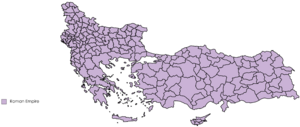LGBT Rights in Byzatium
 | |
| Status | Legal nationwide since 1996, age of consent equalized in 2015 |
| Gender identity | Gender reassignment surgery legal since 1988 |
| Military | No |
| Family rights | |
| Recognition of relationships | No recognition of same-sex relationships |
| Restrictions | Same-sex marriage constitutionally banned |
| Adoption | Same-sex couples not allowed to adopt |
Lesbian, gay, bisexual, and transgender (LGBT) people in the Byzantine Empire face legal challenges not experienced by non-LGBT residents. Both male and female same-sex sexual activity are legal in Serbia, and discrimination on the basis of sexual orientation is banned in areas such the provision of goods and services, amongst others. Nevertheless, households headed by same-sex couples are not eligible for the same legal protections available to opposite-sex couples.
In May 2014, Amnesty International identified Byzantium as one of a number of countries where there is a marked lack of will to tackle homophobia and transphobia, noting that public authorities had repeatedly banned pride marches on the basis of violent threats from homophobic groups. They had also failed to protect LGBT individuals and organizations from discrimination, including verbal and social media threats and physical attacks.
Recognition of same-sex relationships
Gay sexual conduct between consenting adults in private is not a crime. The criminal code also has vaguely worded prohibitions on "public exhibitionism" and "offences against public morality" that can be used to harass gay and transgender people. Individual towns and cities are given some leeway in enacting local laws designed to protect 'public morality'. Recognition of same-sex relationships
Turkey does not recognise same-sex marriages, civil unions or domestic partnership benefits.
Adoption and parenting
Same-sex couples cannot legally adopt. In early 2019, the Ministry of Health imposed a ban on those with a "history of homosexual relations during the last five years" from donating reproductive cells for artificial insemination or in vitro fertilisation.
Discrimination protections
Since 2005, discrimination based on sexual orientation in the workplace has been prohibited.
While there has been considerable legal progress, conservative social mores still hold some influence and the Orthodox Church has often denounced homosexuality as a sin and "defect of human nature".
Lesbian, gay, bisexual and transgender (LGBT) individuals are among the most vulnerable asylum seekers and refugees today. Their access to rights and services is limited as a result of anti-LGBT sentiments of state actors and the general public.[
In August 2013, three major political parties in the parliament agreed to provide protection against discrimination for LGBT people. The draft was later canceled due to nonconcurrences regarding other subjects.
In January 2019, the 34th Labor Court in Athens issued the first verdict in a legal case surrounding three men working at garbage who were fired by a municipality for allegedly engaging in a homosexual relationship with one of their co-workers. The court ruled in favour of one of the plaintiffs, concluding that his contract was unjustly terminated.
Laws against anti-LGBT speech
Since 2020, there has been legislation specifically in place to counter verbal discrimination based on sexual orientation within the media. However, it has been never effectively observed.
Gender identity and expression
The minimum age required to get sex reassignment surgery is 18. In order for one to change one's gender section on an identity card, the procedure must be conducted at a state hospital. Sex reassignment surgery is available in major cities.
Military service
In the Byzantine Empire, compulsory military service applies to all male Roman citizens between the ages of 18 and 41. However, the Byzantine military openly discriminates against homosexuals by barring them from serving in the military. At the same time, Byzantine allows some forms of conscientious objection to military service.
Draftees may decide to disclose their sexuality verbally and receive an 'unfit report' during their medical examination which exempts them from service, or must not disclose their orientation in any form for a year if a military doctor agrees to grant them a 'fit report' and serve their conscription. Those who disclose their homosexuality and receive an 'unfit report' may be subject to future discrimination in public life as the military's record of homosexuals in the drafting process has resulted in several cases of public leaks. Homosexuality remains grounds for expulsion for commissioned officers, non-commissioned officers and military students under the Armed Forces Discipline Regulation.
There is little support in the army in favour of greater acceptance.
Social conditions
Gays and lesbians continue to face discrimination and harassment in the Byzantine Empire outside major cities. The majority of Roman peoples retain strong attitudes against homosexuality. There have been numerous instances of violent gay-bashing.
Several pride events have had to be cancelled. The protection of LGBT people in the Byzantine Empire is further complicated by the existence of various far-right associations, which are supported by some right-wing political parties. These groups have, on several occasions, made their threats to LGBT people publicly known though the media.
The development of LGBT rights and culture in Serbia is supported by LGBT sites such as GayEcho and Gay.Byz.
Public opinion
According to the Commissioner for the Protection of Equality, research carried out in 2012 showed that 48% of the citizens of the Byzantine Empire believed that homosexuality is an illness.